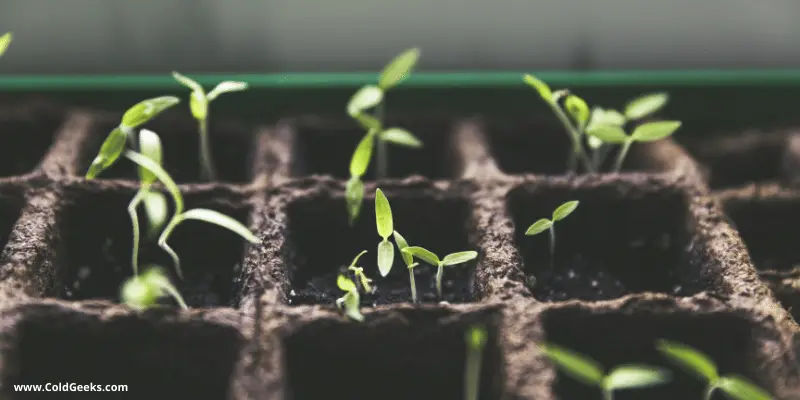When I was new to gardening, I remember trying to figure out how fans would impact my vegetable garden.
That’s why I wanted to create this quick resource for you.
Are fans bad for vegetable gardens?
Fans are not bad for vegetable gardens. In fact, fans can help circulate air, control temperatures, manage humidity, prevent rot, and deter pests that can harm your garden. Fans can hurt your vegetables when they are too strong and too close.
3 Ways Fans Are Bad for Vegetable Gardens

Fans do not usually hurt your vegetable gardens. However, there are three possible ways for fans to harm your vegetables.
Avoid these three things, and you’ll be well on your way to a wonderful garden.
Three ways fans are bad for vegetable gardens:
- When the fan is too strong
- When the fan is too close
- When the fan is aimed directly at your plants
When The Fan Is Too Strong
Fans that are too powerful will blow your leaves, flowers, and vegetables away.
This is not good for the plants because they need these leaves or flowers to produce food.
Fans that are too strong can also damage the soil of a garden.
When The Fan Is Too Close
Fans should be approximately 3 feet away from any plant if you want them to thrive. Even fans that are not too strong can harm your vegetables when they are too close.
If the fan is too close, it can disrupt the temperature of the garden and alter the delicate balance of the humidity.
When the Fan Is Aimed Directly at Your Plants
Fans should be positioned to allow enough air circulation, but not directly at your vegetables.
If you aim the fan at the plant, you could cause damage. Too much wind can harm the seedlings, leaves, and vegetables.
Are Strong Fans Bad for Vegetable Gardens?
Strong fans can be bad for vegetable gardens.
The larger your grow room, the bigger and stronger fan you need to circulate air.
However, a strong fan might eviscerate a small garden.
If your garden is constructed indoors, a strong fan might be too much for it. Do not get a fan that is bigger than what your grow room can handle.
A medium-sized fan should provide enough circulation to make your plants thrive.
Of course, it all depends on the size and layout of your growing space.
Are Ceiling Fans Bad for Vegetable Gardens?
If a ceiling fan is spinning at a low speed, the results will be minimal. But if it’s spinning too fast or too close, it can disturb the soil directly under it.
The good news is that most modern circulation fans have a variable-speed setting so you can experiment to see what works best in your home or garden.
In general, though, slower speeds are better for minimizing the risk of disturbing plants below the fan.
So find something that works for you and enjoy summer evenings without worrying about it harming your veggies! 🙂
Are Misting Fans Bad for Vegetables?
Misting fans are useful in a dry climate, where extra water is scarce due to arid conditions.
The area around the base of the plant tends to stay moist while the rest of it will still get adequate ventilation.
On the other hand, misting fans can cause even more foliar problems because they push humid air into leaf-hair respiratory pores.
This can increase transpiration by forming a film on the leaf surface that facilitates greater diffusion rates.
One common result is gummy soft rot disease (caused by Phytophthora).
Misting fans are good for providing temporary relief from heat and humidity in extremely high temperatures, but more study needs to be done on long-term effects before their effectiveness can be determined at this time, so use with caution.
Will a Fan Dry Soil in Your Vegetable Garden?
Yes, a fan will help the soil dry out more quickly.
This can actually be good because it can help prevent overwatering.
On the other hand, a fan can dangerously accelerate the negative impact of an underwatered vegetable garden.
You must be careful with a fan. It can both help and harm your garden.
5 Reasons Fans Are Good for Vegetable Gardens
Fans can be very useful for vegetable gardens in at least five ways:
- Stimulating seedlings
- Proper airflow
- Prevent Extreme Moisture
- Deter garden pests
- Stronger plants
Stimulate Seedlings
If you start your own plants from seeds indoors, a low-powered fan near them will be quite helpful.
The fan will simulate wind, making the seedlings stronger for when you plant them outside.
As long as you don’t turn a tornado on the seedlings, they should be fine.
Proper Airflow
Fans in enclosed spaces like greenhouses and high tunnel/grow tunnels can be especially useful to provide proper airflow.
During warm weather, stagnant air can be the perfect breeding ground for plant diseases.
Therefore, having a fan inside to provide air circulation will greatly help to prevent disease.
This is particularly important if the structure doesn’t have a way to naturally ventilate, such as windows.
Plants need cool air and wind to grow healthy and avoid rot.
If you’re having issues with greenhouse vegetables getting too hot, remember that both fans and evaporative cooling (using a hose and sprayer) can help keep things cool
Prevent Excessive Dampness
Another use for a fan when starting seeds is generating some extra airflow to ward off excessive dampness.
Seedlings like to grow in a moist environment, but too much moisture can bring on dangerous fungal growth.
Increasing the air movement in your seed-starting room can help you keep moisture levels in better balance.
Deter Garden Pests
Fans can prevent some pests from invading your vegetable garden.
Especially smaller, flying insects such as flies, mosquitos, and gnats. The extra wind from the fans makes it harder for the insects to fly around and through your garden.
If they do get in, the strong airflow can carry them back out again.
Stronger Plants
Finally, a fan can help your plants grow stronger and healthier.
The wind pushes against the roots, building strength and resistance. Over time, this can prove very beneficial for your plants.
This is particularly true for potatoes and other root crops that tend to grow best in dryer conditions.
Here’s a short video about why you need a fan for your seedling plants:
The Best Fans for Vegetable Gardens
There are a number of different fans that can help you grow your best vegetable garden (especially in a grow room, grow tent, or greenhouse).
I recommend getting a circulation fan, inline duct fan, and (potentially) a misting fan.
A circulation fan will oscillate, or move back and forth, to push air around your vegetable garden. This is particularly useful for indoor vegetable gardens.
An inline duct fan helps push air that is trapped in ducts out into your grow room.
You might also consider investing in a misting fan. Misting fans if you live in a very dry climate.
Misting can help clean dust and debris from your plants while also ensuring proper moisture. However, too much misting can lead to fungal growth and rot, so please be careful.
Here is a table of my recommendations for the best fans for your vegetable garden:
| Type of Fan | Best Fan |
|---|---|
| Circulating Fan | Versa Cool Greenhouse Circulation Fan |
| Inline Duct Fan | Vivosun Inline Greenhouse Duct Fan |
| Misting Fan (optional) | Frigidaire Outdoor Misting Fan & Pedestal Fan |
Final Thoughts
When you garden, small changes can make a very big difference to your success or failure.
The right circulation, humidity, and moisture can mean a bountiful harvest or an expensive and frustrating mess.
My best advice is to go slow, start small, and get the best equipment that you can afford. You can also scale up in the future with even better equipment.
What to read next:
- Are fans bad for fruit? (Answered)
- Do fans deter pests? (Answers for 14 pests)
- What Is a Hugger Fan? (Explained for Beginners)
Sources
Better Homes and Gardens
Agronomy (Journal)
Science Direct
UrbanOrganicYield
